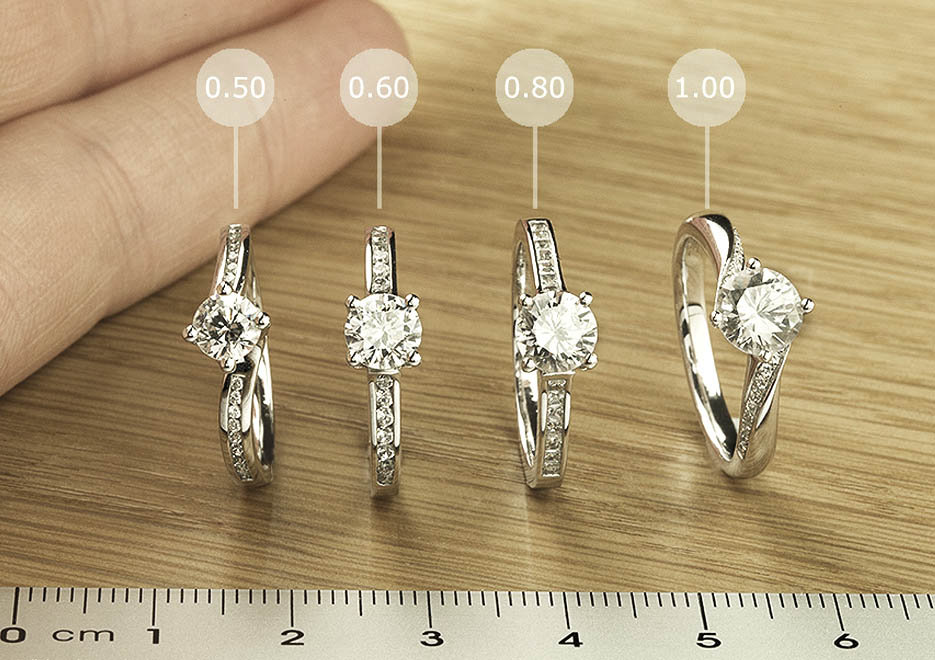The ideal metal for an engagement ring is as important as choosing the perfect diamond or gemstone. The choice of metal can significantly influence the overall appearance, durability, and comfort of the ring. To make the best selection, one must understand the various metal options available and their unique attributes.
Gold – The Traditional Choice
Gold has been the choice for engagement rings for centuries. Renowned for its luster and rarity, gold’s versatility makes it suitable for all types of engagement rings. It’s malleable and easy to work with, allowing jewelers to create intricate and detailed designs.
Gold purity is measured in karats, with 24-karat gold being the purest form. However, 24k gold is not typically used for engagement rings because of its softness. Instead, jewelers use 14k or 18k gold, which is durable and resilient because they’re mixed with other metal alloys.
Gold comes in various colors, including yellow, white, and rose. Yellow gold is the purest color and is the most hypoallergenic. White gold, coated with rhodium for a lustrous finish, has a modern and contemporary feel. Rose gold, on the other hand, exudes a vintage vibe with its pinkish hue resulting from a combination of gold and copper alloy.
Platinum – The Durable Luxe
Platinum is a popular choice for those who prefer a white metal but want something more durable and premium than white gold. Its natural white sheen doesn’t fade or change color over time, making it a great symbol of everlasting love.
While it is heavier and more durable than gold, platinum is also more expensive due to its rarity and density. However, its durability means it’s less likely to scratch and doesn’t require as much maintenance. Platinum is also hypoallergenic, making it suitable for those with sensitive skin.
Palladium – The Light Alternative
Palladium, like platinum, is a member of the platinum metal group, boasting many of the same benefits but at a lower cost. It’s durable, doesn’t tarnish, and is lighter than platinum, making it comfortable for everyday wear.
Palladium is naturally white, so it doesn’t need rhodium plating like white gold. It’s also hypoallergenic, making it an excellent choice for those with skin sensitivities. However, it’s less commonly used, so fewer design options are available than gold and platinum.
Sterling Silver – The Affordable Option
Sterling silver, a white metal alloy composed of 92.5% silver and 7.5% other metals, is another option for engagement rings. It’s the most affordable of all precious metals used in engagement rings, making it an attractive choice for those on a tight budget.
Despite its affordability, sterling silver is malleable and prone to scratching and tarnishing. It requires more maintenance than other metals to keep its shine and luster. But, with the proper care, a sterling silver ring can last a lifetime.
Titanium – The Modern Selection
Titanium engagement rings are a modern choice, known for their strength, lightness, and durability. This metal is three times the strength of steel yet much lighter, making it comfortable for everyday wear.
Titanium is hypoallergenic and has an excellent gray color, making it a favorite among modern grooms. One thing to note, however, is that titanium rings cannot be resized due to their strength. Therefore, accurate sizing is crucial when purchasing a titanium ring.
Tungsten Carbide – The Resilient Pick
Tungsten carbide is another contemporary choice for engagement rings. Known for its extreme hardness and high resistance to scratching, it’s the most scratch-resistant metal available for engagement rings.
Tungsten carbide has a hefty weight, giving a substantial feel to the finger. It comes in white, gray, or black. Tungsten carbide rings cannot be resized like titanium, so accurate sizing is vital.
Choosing the suitable metal for an engagement ring depends on personal style, lifestyle, and budget. Each metal has its unique characteristics, advantages, and disadvantages. By understanding the different engagement ring metals, you can make an informed decision that best fits your and your partner’s preferences.

For 10 years, I’ve been in the luxury publishing industry, editing magazines with a special emphasis on watches and jewellery. I bring passion and authority to my work, featuring fresh jewelry collections, interviewing renowned designers and historians, reviewing globally-acclaimed jewelry books, and keeping my audience updated on trade show happenings. I take pride in highlighting jewelers who specialize in vintage or antique pieces.




